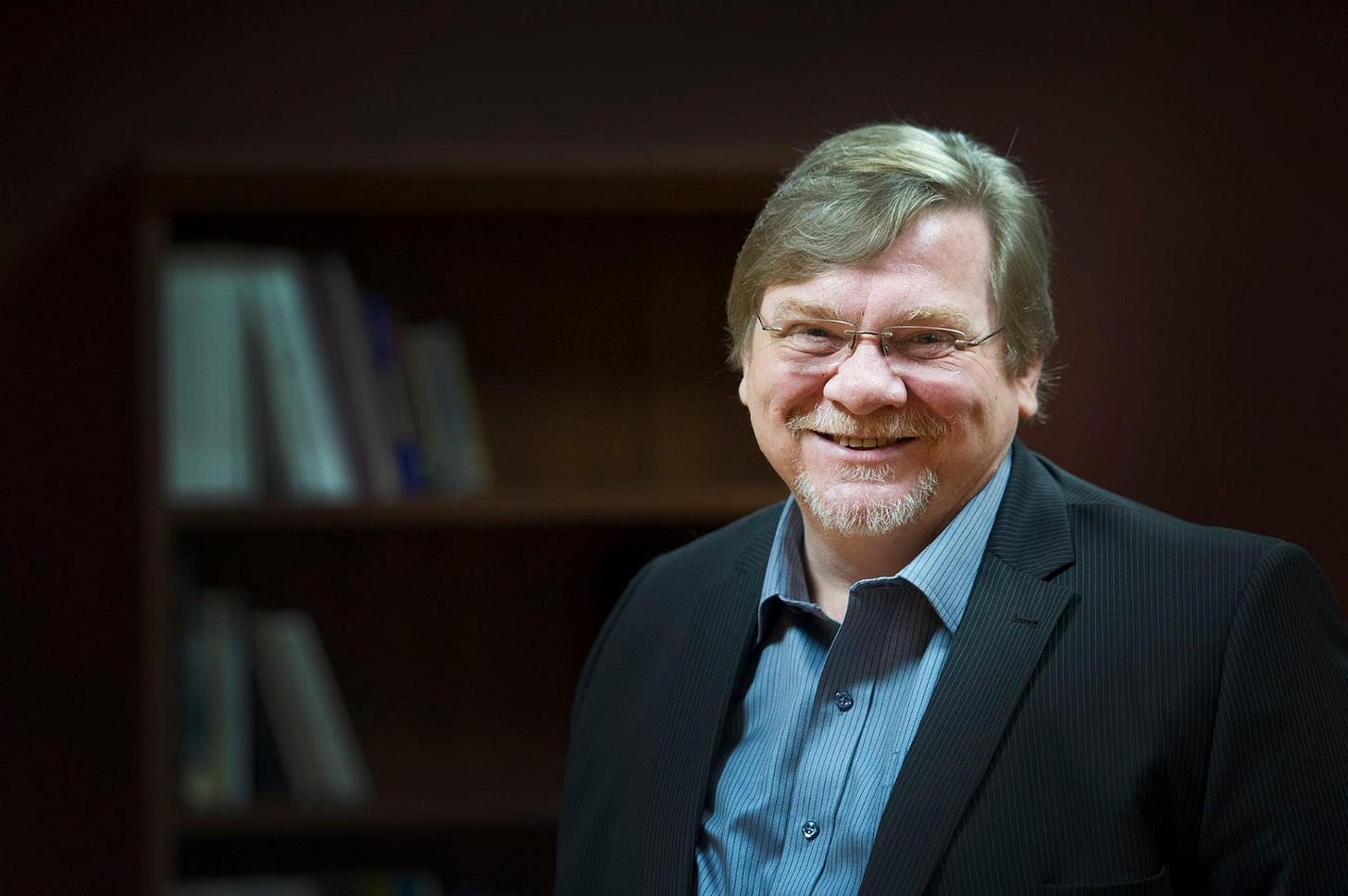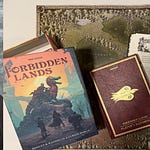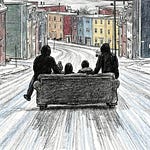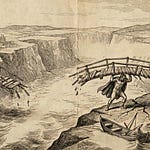No Trial for Papa
Please read the original short story by Erwin J. Warkentin featured and discussed on this podcast
Interview with Dr. Erwin J. Warkentin
Dups: You just heard me read out a story called “No Trial for Papa” by Dr. Erwin J. Warkentin, who is here with me today. And welcome back to Tales Under the Cat Tree.
Erwin: Well, you know that I always enjoy talking to you. This is just a little bit of a different forum.
Dups: It’s the second show, so part number two of Erwin and Dups Do a Podcast. Erwin, that was a very hard read for me. It’s quite an emotional story from start to finish. I first want to ask you the very simple question: Is this fact or is this fiction?
Erwin: In German, you would say jein. That is a combination of yes (ja) and no (nein). In other words, yes, there’s a lot of truth to it. It’s based on truth. But it’s fictional in the sense that it’s a very generic story, that it’s made up of different bits and pieces. And then, of course, my own imagination filling in blanks. So, yes, it’s true. And no, it isn’t.
Dups: You and I, of course, had a chat about this story before I read it out. I have a picture that you gave me that I have published with the story. So you can go have a look at it. This picture revolves around the people about whom part of the story is about.
Erwin: On the left, there’s a young boy. He’s about eight years old. That’s my father. This is 1929 or so. And next to him, that’s his sister, and the lady in the middle, that’s my grandmother. At this point, she’s all of about 32, and she looks considerably older than 32. And then, of course, next to her is my grandfather. These are the people about whom the story is about. They’re the characters in the story.
Their name, of course, is Warkentin and not Classen, as I indicated in the story. And so this is a little bit of that alienating effect that’s taking place for me, where I’m taking some distance from it. It takes place in the Ukraine at the time of the Soviet Union. They are the drivers behind the story. And for me, each of them kind of holds a very special place.
Dups: So in the story then, if I’m understanding it correctly, the young boy is your father. The mother is, of course, your grandmother. And David Classen, who gets shot, is your grandfather.
Erwin: Exactly
Dups: First of all, what is the year that you’ve set this story in? So when did this happen?
Erwin: This story actually takes place in 1937. So the people in the story, in the picture, are actually a lot older. My father is about 16 at this point. His sister is about 14. And then, of course, my grandfather and my grandmother are older as well. This was the time of the great purges in the Soviet Union. Stalin decided it was a good idea to kind of get rid of all of what he called the kulaks.
These people, these undesirables, people that he considered to be parasites on society. And oddly enough, in this part of the Soviet Union, it was mostly the Germans and particularly the Mennonites that made up this class of people that he wanted to get rid of. Essentially, he wanted to take all of their stuff. He wanted to take their land from them, which they had already effectively done, but he needed them out of the way. And so that’s kind of the historical background of what was going on at the time.
Now, specific to this, my grandfather and my grandmother and my father were actually taken prisoner in 1937. They were grabbed by the local powers that be. And my grandfather, I found recently, was executed on October 31st, 1937. The Soviets were actually very efficient. It was just a single bullet to the back of the head. And so there were thousands upon thousands of people that died in this way.
My father, for the longest time, assumed that he had died of starvation. He had been sent to Siberia. That was the typical story. He disappeared to Siberia. That didn’t happen. He was killed before he actually had the opportunity to die in Siberia.
My father was saved by his age. He didn’t like left-wing politics at all, and that’s really putting it mildly. But he did say there was one communist in there that came into the prison where they were being held, took one look at him and his documentation, and said, he’s not of age of majority. He’s not old enough. He’s not 17. It was 17 at that time in the Soviet Union. So he has to go home. And since he’s not of the age of majority, his mother has to accompany him home. And so they were sent back to their village. In the meantime, his brother and two sisters had been put into an orphanage. They then had to go and collect them and try to put the family back together. So he then survived that part of what was really a horrible beginning to life. It was not a pleasant time to be alive. Not for many people.
Dups: And then from there, somehow your family managed to make it to Canada and to Manitoba.
Erwin: My father did. My grandmother was eventually… She had actually made it as far as Berlin in 1944. And then she was grabbed by the Russians once they took over Berlin. And they sent her to Kazakhstan along with her other three children. My father had been in the German army and he’d been taken prisoner at the end of hostilities. And so he was safe as it were, although the Russians did come for him too.
There was an American officer, again, there’s this strange thing about kindness of strangers along the way who told him that they were coming for him and that he should under no circumstances leave his barracks on a particular day, no matter what. And so he didn’t. This American officer simply told the Russians that this guy had been a problem since day one, and they’d eventually shot him. And his body had kind of gone down the river. He was trying to escape or some story like that. And I always kind of took that with a grain of salt, my father’s story, until I met the American who came and visited him. This was years and years and years later. I was already married at this point. And it turned out the whole story was true. So there’s this whole idea of sometimes truth can be fiction and sometimes fiction can be truth. And, you know, we simply don’t know.
Dups: Well, I think this then comes to the very important question that I have for you, which is, why did you not write the absolute truth here? And why did you make it into a story with some truth and some fiction?
Erwin: Yeah. Honestly, my first thought was to spare myself. It’s an incredibly emotional story for me because of who’s involved with it. If you think of it, that night in many respects determined who my father was going to be for the rest of time, for his time anyway, and what kind of a father he was going to be to me and all the rest of it. It also determined that I would essentially grow up without a grandparent. My grandmother did live until 1964, and I do have letters and postcards from her, but that’s it. And some pictures. And so for me, it was to kind of step back from it, but also make it relatable to other people.
This was not an isolated incident. This repeated itself over a period of two years or so, in countless different homes. In each and every case, it was a little bit different. And so what I wanted to do was borrow from these other stories so that others could kind of latch onto a part of the story and say, this is part of who I am, or I can relate to this because. And so it becomes an amalgam of truths that in and of themselves are fiction once they’re all put together.
Dups: And why do you think this kind of story is important today?
Erwin: It’s a warning in some respects of things that can happen if you allow authoritarian-type governments and people to have too much power in the world. It also passes my story on, hopefully, to another generation so that they know who I am, but even more importantly, that they know who my father was and who my grandparents were and my aunt was, you know, the young girl in the picture. I mean, they don’t figure prominently in the story, but that’s by design. It’s important for the reason of keeping their memories alive and allowing for some sort of emotional connection between the present and the past. In some ways saying, well, you know, we aren’t that different.
Sometimes people of today consider themselves perhaps a little superior to the people of the past because we know so much more. And the thing is, this notion of my grandfather reaching out and kind of comforting my father, you know, that’s something that we would expect today. But somehow we have this notion of the fathers and grandfathers of previous generations being so stoic and distant that they didn’t do this. The fathers have always done this and they will always continue to do this. So it’s those sorts of things to kind of break down some of these historical stereotypes that we might have.
Dups: This goes back to the idea of the role of creative writing. And for me, one of the problems that I have is when we write anything about history, we tend to put what is happening today into the past, even though we have absolutely no idea how the past was. Because we really weren’t alive then. And a lot of things actually were different then. A lot of expressions were different then. Even the way that they did treat children was different then. How does this fit? Like in terms of trying to reconcile the two things. One, the past was very different, but it is at the same time very similar.
Erwin: What we want to do is we want to also recognize and know these people as human beings. I think that’s part of it. So we try to modernize them. And in some ways, that’s what we’re doing with historical fiction today. I mean, it’s all the rage. Every which way you look, there’s historical fiction going on. And that’s because we’re trying to fill in these blanks and make this thing perhaps a little more real for ourselves. But I don’t think we can get away from the notion of we can create distance from our present situation by looking at the past.
And this is something that goes back to someone like Friedrich Schiller, the German author. And he wrote quite a few theoretical works about literature. And one of them was that a work of literature is essentially, and he didn’t have language for it at the time, but a simulation that you run. And okay, what if the person said this? What would happen? And he wrote a lot of historical fiction. And for him, it was always this experiment. What if they did this slightly differently? What would the outcome be? And so to some degree, when we do this, we’re looking at these other possibilities and possibilities perhaps missed in our past.
Dups: That’s a very good way of putting it. I mean, this is what stories are, simulations of ideas, of thoughts, of things that we want to do, that we wish we could have done, that make us want to do something, desire, hate, everything.
Erwin: Yeah. And the funny thing is that I can’t even take credit for that. I have to give credit to a man from 225 years ago who was doing exactly the same thing then that we’re doing now.
Dups: You’ve told me that there’s an aftermath to this that is quite interesting and fascinating, because your grandfather was designated as a German spy, and that’s why he was executed.
Erwin: Well, after the fact, he was considered a German spy for many, many years until about 1986. He eventually was given not a pardon, but he was declared rehabilitated. And that’s kind of the official term that was used in the USSR. My father made a number of trips to Germany, and I was always a little curious as to what he was doing there because he seemed to be meeting with different people that I knew nothing about. Normally, I would have helped him with this, but somehow he had been in communication with the Russian government at the time. Well, it still would have been the USSR. And then eventually in ‘86, somewhere ‘86 to ‘88, the documents indicate that Gorbachev actually rehabilitated him. That is my grandfather. In other words, he didn’t do it. He wasn’t a spy.
Dups: Having gone through this story and having had this discussion, for anyone who’s reading this today, listening to this podcast, listening to the story, what’s the biggest takeaway?
Erwin: The biggest takeaway is that you have to cherish and appreciate every moment that you have with those people around you because you don’t know when you’re not going to have any more moments.
Dups: And I think with that, we will say thank you very much to Erwin for coming on the show and talking about “No Trial for Papa.”
Erwin: Well, thank you very much for having me. Well, I was going to say I enjoyed this. It’s hard, but I did enjoy this.
Dups: Erwin, you’re going to be back again, right? We’re going to do another couple of episodes on different subjects.
Erwin: Exactly. And I think at some point I get to turn the tables.
Dups: Yes, yes, you will. But that’s to be coming up in the future. Again, thank you very much, Erwin.
















